Unit 3 Could you please clean your room知识清单导学案-2025人教版英语八年级下册(含答案)
文档属性
| 名称 | Unit 3 Could you please clean your room知识清单导学案-2025人教版英语八年级下册(含答案) |
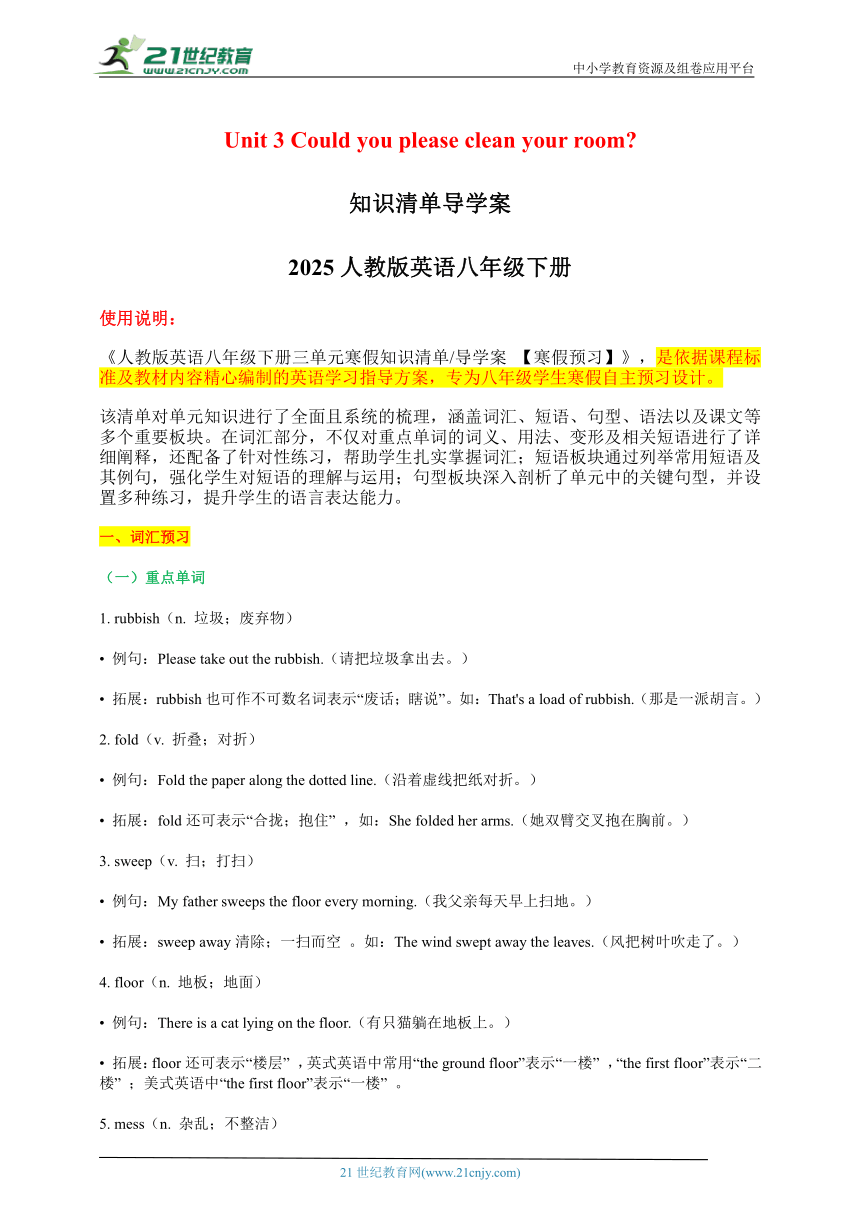
|
|
| 格式 | doc | ||
| 文件大小 | 290.9KB | ||
| 资源类型 | 试卷 | ||
| 版本资源 | 人教新目标(Go for it)版 | ||
| 科目 | 英语 | ||
| 更新时间 | 2025-02-28 17:04:23 | ||
图片预览

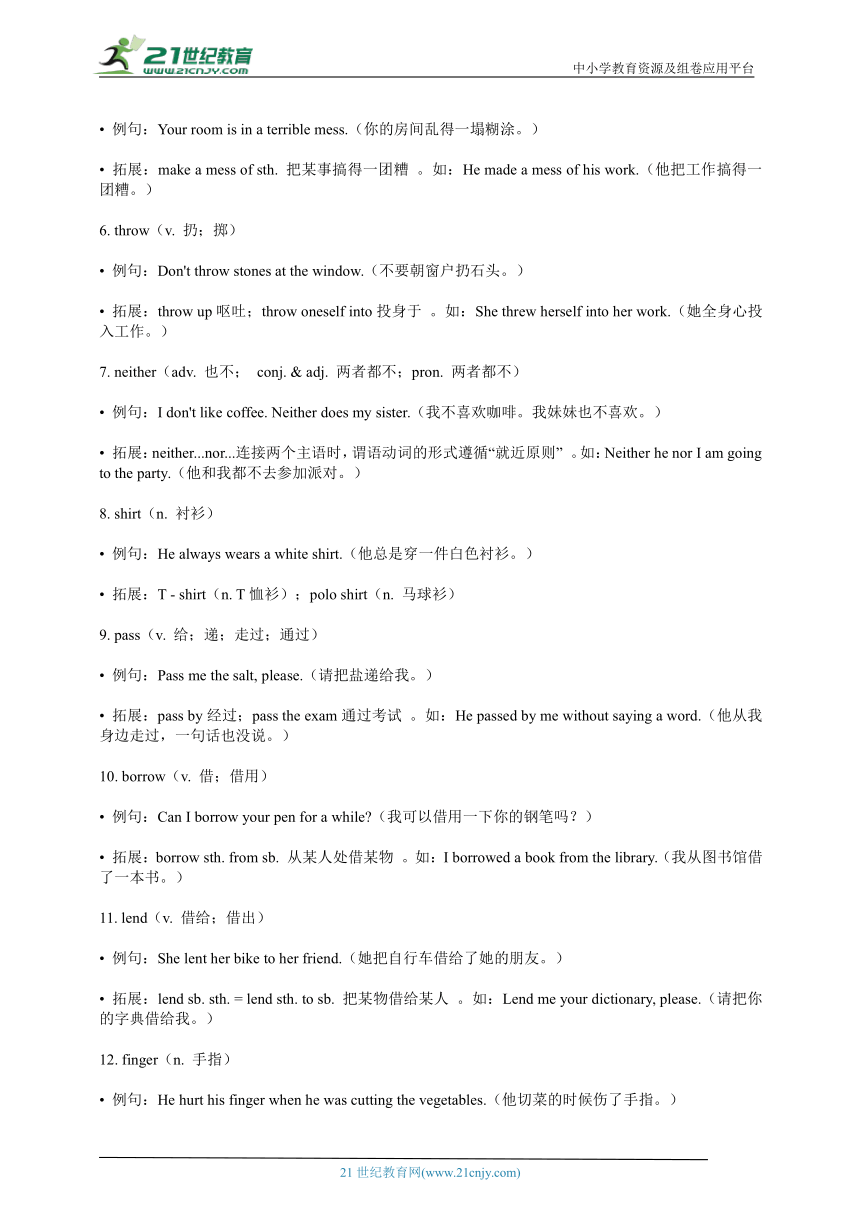
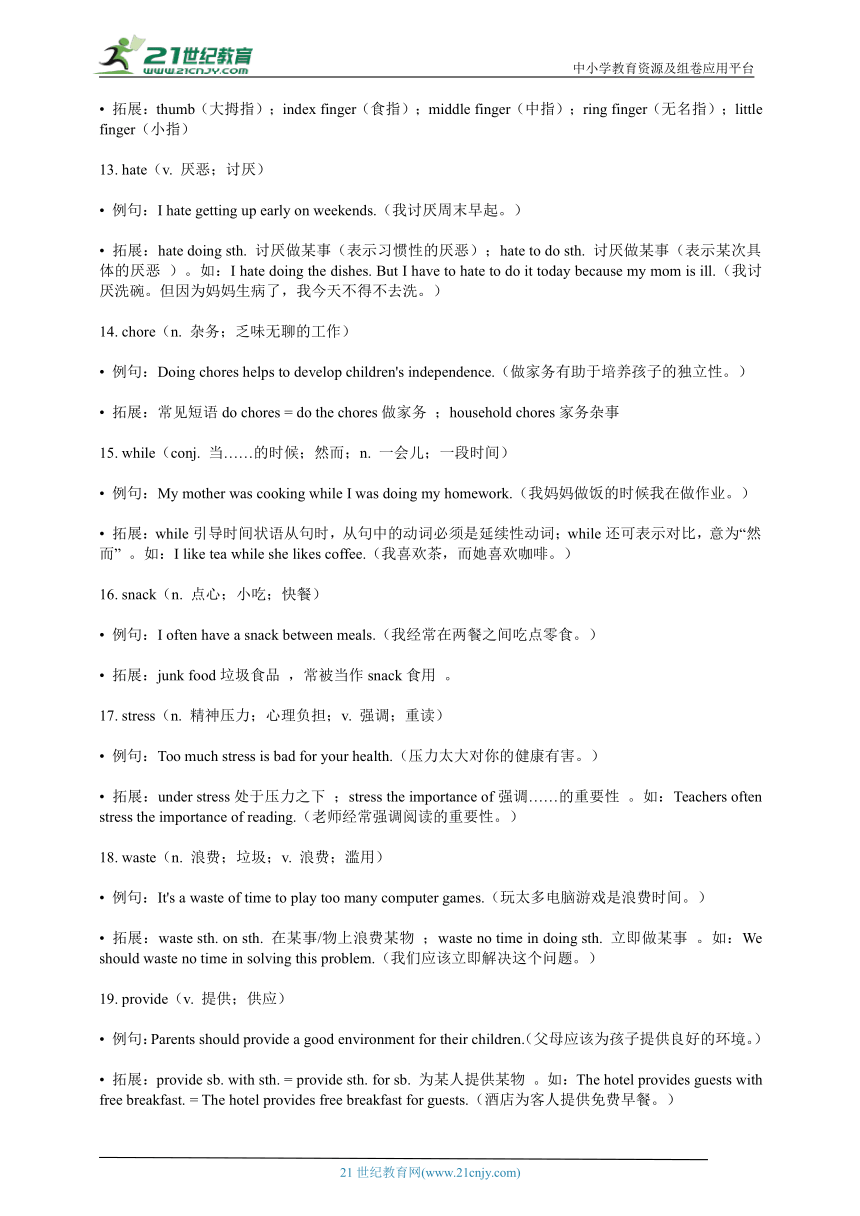
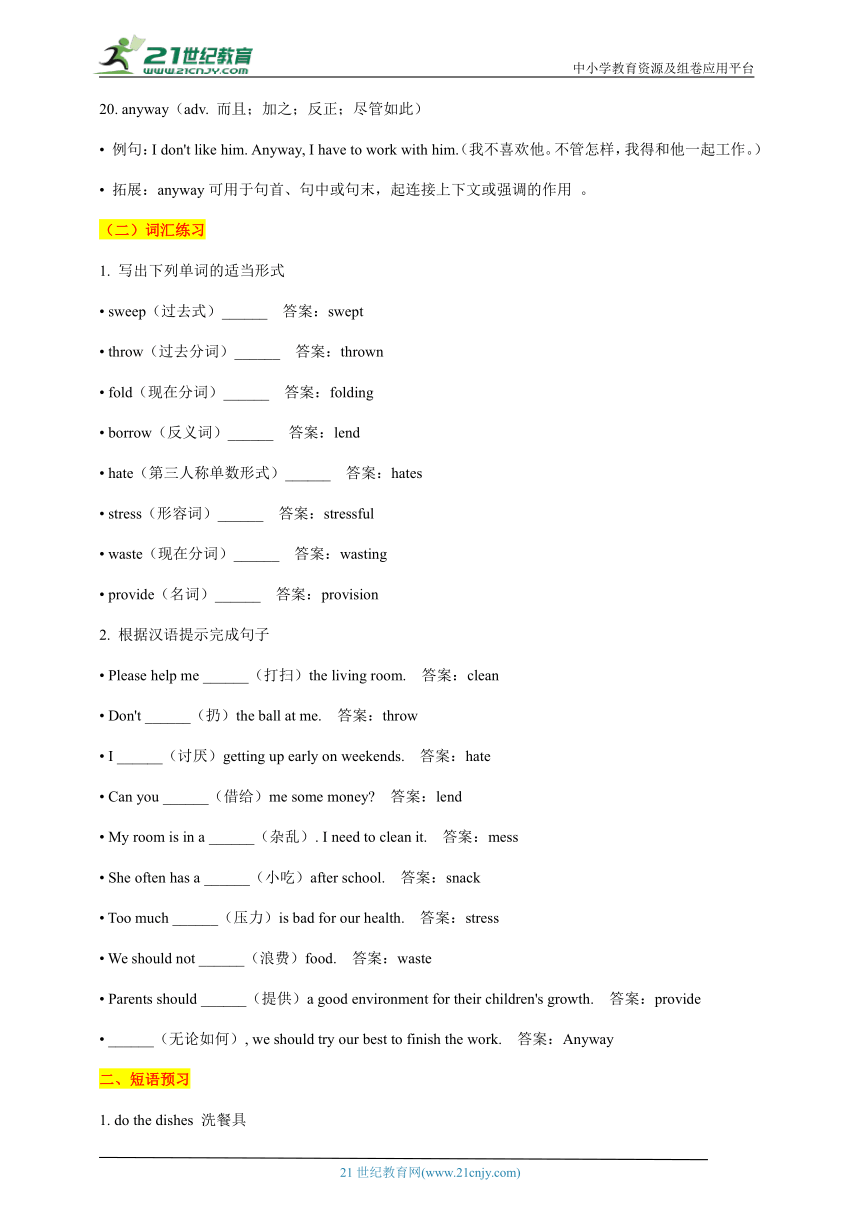
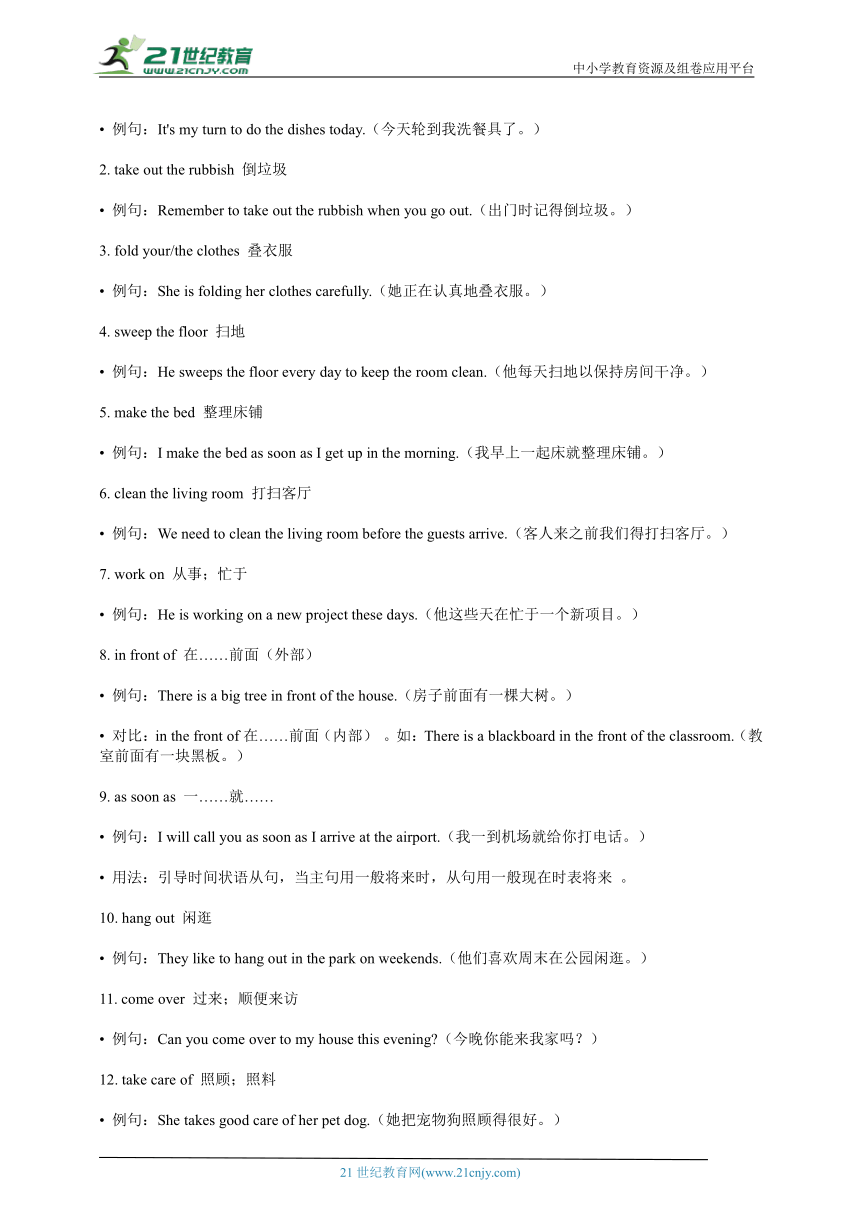
文档简介
中小学教育资源及组卷应用平台
Unit 3 Could you please clean your room
知识清单导学案
2025人教版英语八年级下册
使用说明:
《人教版英语八年级下册三单元寒假知识清单/导学案 【寒假预习】》,是依据课程标准及教材内容精心编制的英语学习指导方案,专为八年级学生寒假自主预习设计。
该清单对单元知识进行了全面且系统的梳理,涵盖词汇、短语、句型、语法以及课文等多个重要板块。在词汇部分,不仅对重点单词的词义、用法、变形及相关短语进行了详细阐释,还配备了针对性练习,帮助学生扎实掌握词汇;短语板块通过列举常用短语及其例句,强化学生对短语的理解与运用;句型板块深入剖析了单元中的关键句型,并设置多种练习,提升学生的语言表达能力。
一、词汇预习
(一)重点单词
1. rubbish(n. 垃圾;废弃物)
例句:Please take out the rubbish.(请把垃圾拿出去。)
拓展:rubbish也可作不可数名词表示“废话;瞎说”。如:That's a load of rubbish.(那是一派胡言。)
2. fold(v. 折叠;对折)
例句:Fold the paper along the dotted line.(沿着虚线把纸对折。)
拓展:fold还可表示“合拢;抱住” ,如:She folded her arms.(她双臂交叉抱在胸前。)
3. sweep(v. 扫;打扫)
例句:My father sweeps the floor every morning.(我父亲每天早上扫地。)
拓展:sweep away清除;一扫而空 。如:The wind swept away the leaves.(风把树叶吹走了。)
4. floor(n. 地板;地面)
例句:There is a cat lying on the floor.(有只猫躺在地板上。)
拓展:floor还可表示“楼层” ,英式英语中常用“the ground floor”表示“一楼” ,“the first floor”表示“二楼” ;美式英语中“the first floor”表示“一楼” 。
5. mess(n. 杂乱;不整洁)
例句:Your room is in a terrible mess.(你的房间乱得一塌糊涂。)
拓展:make a mess of sth. 把某事搞得一团糟 。如:He made a mess of his work.(他把工作搞得一团糟。)
6. throw(v. 扔;掷)
例句:Don't throw stones at the window.(不要朝窗户扔石头。)
拓展:throw up呕吐;throw oneself into投身于 。如:She threw herself into her work.(她全身心投入工作。)
7. neither(adv. 也不; conj. & adj. 两者都不;pron. 两者都不)
例句:I don't like coffee. Neither does my sister.(我不喜欢咖啡。我妹妹也不喜欢。)
拓展:neither...nor...连接两个主语时,谓语动词的形式遵循“就近原则” 。如:Neither he nor I am going to the party.(他和我都不去参加派对。)
8. shirt(n. 衬衫)
例句:He always wears a white shirt.(他总是穿一件白色衬衫。)
拓展:T - shirt(n. T恤衫);polo shirt(n. 马球衫)
9. pass(v. 给;递;走过;通过)
例句:Pass me the salt, please.(请把盐递给我。)
拓展:pass by经过;pass the exam通过考试 。如:He passed by me without saying a word.(他从我身边走过,一句话也没说。)
10. borrow(v. 借;借用)
例句:Can I borrow your pen for a while (我可以借用一下你的钢笔吗?)
拓展:borrow sth. from sb. 从某人处借某物 。如:I borrowed a book from the library.(我从图书馆借了一本书。)
11. lend(v. 借给;借出)
例句:She lent her bike to her friend.(她把自行车借给了她的朋友。)
拓展:lend sb. sth. = lend sth. to sb. 把某物借给某人 。如:Lend me your dictionary, please.(请把你的字典借给我。)
12. finger(n. 手指)
例句:He hurt his finger when he was cutting the vegetables.(他切菜的时候伤了手指。)
拓展:thumb(大拇指);index finger(食指);middle finger(中指);ring finger(无名指);little finger(小指)
13. hate(v. 厌恶;讨厌)
例句:I hate getting up early on weekends.(我讨厌周末早起。)
拓展:hate doing sth. 讨厌做某事(表示习惯性的厌恶);hate to do sth. 讨厌做某事(表示某次具体的厌恶 )。如:I hate doing the dishes. But I have to hate to do it today because my mom is ill.(我讨厌洗碗。但因为妈妈生病了,我今天不得不去洗。)
14. chore(n. 杂务;乏味无聊的工作)
例句:Doing chores helps to develop children's independence.(做家务有助于培养孩子的独立性。)
拓展:常见短语do chores = do the chores做家务 ;household chores家务杂事
15. while(conj. 当……的时候;然而;n. 一会儿;一段时间)
例句:My mother was cooking while I was doing my homework.(我妈妈做饭的时候我在做作业。)
拓展:while引导时间状语从句时,从句中的动词必须是延续性动词;while还可表示对比,意为“然而” 。如:I like tea while she likes coffee.(我喜欢茶,而她喜欢咖啡。)
16. snack(n. 点心;小吃;快餐)
例句:I often have a snack between meals.(我经常在两餐之间吃点零食。)
拓展:junk food垃圾食品 ,常被当作snack食用 。
17. stress(n. 精神压力;心理负担;v. 强调;重读)
例句:Too much stress is bad for your health.(压力太大对你的健康有害。)
拓展:under stress处于压力之下 ;stress the importance of强调……的重要性 。如:Teachers often stress the importance of reading.(老师经常强调阅读的重要性。)
18. waste(n. 浪费;垃圾;v. 浪费;滥用)
例句:It's a waste of time to play too many computer games.(玩太多电脑游戏是浪费时间。)
拓展:waste sth. on sth. 在某事/物上浪费某物 ;waste no time in doing sth. 立即做某事 。如:We should waste no time in solving this problem.(我们应该立即解决这个问题。)
19. provide(v. 提供;供应)
例句:Parents should provide a good environment for their children.(父母应该为孩子提供良好的环境。)
拓展:provide sb. with sth. = provide sth. for sb. 为某人提供某物 。如:The hotel provides guests with free breakfast. = The hotel provides free breakfast for guests.(酒店为客人提供免费早餐。)
20. anyway(adv. 而且;加之;反正;尽管如此)
例句:I don't like him. Anyway, I have to work with him.(我不喜欢他。不管怎样,我得和他一起工作。)
拓展:anyway可用于句首、句中或句末,起连接上下文或强调的作用 。
(二)词汇练习
1. 写出下列单词的适当形式
sweep(过去式)______ 答案:swept
throw(过去分词)______ 答案:thrown
fold(现在分词)______ 答案:folding
borrow(反义词)______ 答案:lend
hate(第三人称单数形式)______ 答案:hates
stress(形容词)______ 答案:stressful
waste(现在分词)______ 答案:wasting
provide(名词)______ 答案:provision
2. 根据汉语提示完成句子
Please help me ______(打扫)the living room. 答案:clean
Don't ______(扔)the ball at me. 答案:throw
I ______(讨厌)getting up early on weekends. 答案:hate
Can you ______(借给)me some money 答案:lend
My room is in a ______(杂乱). I need to clean it. 答案:mess
She often has a ______(小吃)after school. 答案:snack
Too much ______(压力)is bad for our health. 答案:stress
We should not ______(浪费)food. 答案:waste
Parents should ______(提供)a good environment for their children's growth. 答案:provide
______(无论如何), we should try our best to finish the work. 答案:Anyway
二、短语预习
1. do the dishes 洗餐具
例句:It's my turn to do the dishes today.(今天轮到我洗餐具了。)
2. take out the rubbish 倒垃圾
例句:Remember to take out the rubbish when you go out.(出门时记得倒垃圾。)
3. fold your/the clothes 叠衣服
例句:She is folding her clothes carefully.(她正在认真地叠衣服。)
4. sweep the floor 扫地
例句:He sweeps the floor every day to keep the room clean.(他每天扫地以保持房间干净。)
5. make the bed 整理床铺
例句:I make the bed as soon as I get up in the morning.(我早上一起床就整理床铺。)
6. clean the living room 打扫客厅
例句:We need to clean the living room before the guests arrive.(客人来之前我们得打扫客厅。)
7. work on 从事;忙于
例句:He is working on a new project these days.(他这些天在忙于一个新项目。)
8. in front of 在……前面(外部)
例句:There is a big tree in front of the house.(房子前面有一棵大树。)
对比:in the front of在……前面(内部) 。如:There is a blackboard in the front of the classroom.(教室前面有一块黑板。)
9. as soon as 一……就……
例句:I will call you as soon as I arrive at the airport.(我一到机场就给你打电话。)
用法:引导时间状语从句,当主句用一般将来时,从句用一般现在时表将来 。
10. hang out 闲逛
例句:They like to hang out in the park on weekends.(他们喜欢周末在公园闲逛。)
11. come over 过来;顺便来访
例句:Can you come over to my house this evening (今晚你能来我家吗?)
12. take care of 照顾;照料
例句:She takes good care of her pet dog.(她把宠物狗照顾得很好。)
同义短语:look after
13. depend on 依靠;信赖;取决于
例句:Children should not depend too much on their parents.(孩子不应该过于依赖父母。)
拓展:depend on sb. to do sth. 依靠某人做某事 。如:We depend on him to solve the problem.(我们依靠他来解决这个问题。)
14. do one's part in (doing) sth. 尽自己的一份力量做某事
例句:Everyone should do their part in protecting the environment.(每个人都应该尽自己的一份力量保护环境。)
15. in order to 为了
例句:She gets up early in order to catch the first bus.(她早起是为了赶上第一班公交车。)
用法:后接动词原形,表目的 ,可位于句首或句中 。
16. get into a good university 考上一所好大学
例句:He studies hard to get into a good university.(他努力学习是为了考上一所好大学。)
17. fall ill 生病
例句:She fell ill and had to stay at home.(她生病了,不得不待在家里。)
18. as a result 结果
例句:He didn't study hard. As a result, he failed the exam.(他学习不努力。结果,他考试不及格。)
19. share the housework 分担家务
例句:All family members should share the housework.(所有家庭成员都应该分担家务。)
20. a waste of time 浪费时间
例句:Watching too much TV is a waste of time.(看太多电视是浪费时间。)
短语练习
1. 写出下列短语的汉语意思
do the dishes ______ 答案:洗餐具
take out the rubbish ______ 答案:倒垃圾
fold the clothes ______ 答案:叠衣服
sweep the floor ______ 答案:扫地
make the bed ______ 答案:整理床铺
clean the living room ______ 答案:打扫客厅
work on ______ 答案:从事;忙于
in front of ______ 答案:在……前面(外部)
as soon as ______ 答案:一……就……
hang out ______ 答案:闲逛
come over ______ 答案:过来;顺便来访
take care of ______ 答案:照顾;照料
depend on ______ 答案:依靠;信赖;取决于
do one's part in (doing) sth. ______ 答案:尽自己的一份力量做某事
in order to ______ 答案:为了
get into a good university ______ 答案:考上一所好大学
fall ill ______ 答案:生病
as a result ______ 答案:结果
share the housework ______ 答案:分担家务
a waste of time ______ 答案:浪费时间
2. 用适当的短语填空
You should ______ after you get up in the morning. 答案:make the bed
My father often helps my mother ______ after dinner. 答案:do the dishes
Please ______ the book when you finish reading it. 答案:put away(补充短语,把……收起来放好 ,与语境相符,预习清单中虽未提及,可作为拓展 )
I will tell him the news ______ he comes back. 答案:as soon as
She likes to ______ with her friends on weekends. 答案:hang out
We should not ______ our parents too much. We need to be independent. 答案:depend on
Everyone should ______ in keeping our classroom clean. 答案:do their part
He studies hard ______ pass the exam. 答案:in order to
She ______ yesterday and had to see a doctor. 答案:fell ill
Playing computer games all day is ______. 答案:a waste of time
三、句型预习
1. Could you please do sth. 请你做某事好吗?
例句:Could you please open the window It's a bit hot here.(请你打开窗户好吗?这里有点热。)
用法:这是一个表示委婉请求的句型 ,could在这里不是can的过去式 。其肯定回答常用“Sure. / Of course. / No problem.”等;否定回答常用“Sorry, I can't. I have to...”等 。
2. Could I do sth. 我可以做某事吗?
例句:Could I use your computer for a while (我可以用一会儿你的电脑吗?)
用法:同样用于表示请求,语气委婉 。肯定回答常用“Sure. / Yes, you can.”等;否定回答常用“Sorry, you can't.”等 。
3. “Why don't you do sth. ” = “Why not do sth. ” 为什么不做某事呢?
例句:Why don't you go to the movies with us = Why not go to the movies with us (你为什么不和我们一起去看电影呢?)
用法:这两个句型都用于提出建议,后接动词原形 。
4. “It's + adj. + for sb. + to do sth.”
例句:It's important for us to learn a foreign language.(对我们来说学一门外语很重要。)
用法:it作形式主语,真正的主语是后面的动词不定式短语 ,for sb.表示“对于某人来说” 。当形容词是描述人的性格、品质等时,用“of sb.” ,如:It's kind of you to help me.(你帮助我真是太好了。)
5. “spend + 时间/金钱 + (in) doing sth.” 花费时间/金钱做某事
例句:I spent two hours (in) doing my homework yesterday.(我昨天花了两个小时做作业。)
用法:spend的主语是人,还可以用“spend + 时间/金钱 + on sth.”
句型练习
1. 按要求完成句子
Could you please clean your room (作肯定回答)
______, ______. 答案:Sure; I can
Could I watch TV now (作否定回答)
______, you ______. 答案:Sorry; can't
Why not go to the park (改为同义句)
Why ______ ______ go to the park 答案:don't you
It's important for us to learn English well.(对画线部分提问)
______ is it important for us ______ ______ 答案:What; to do
He spent three hours making the model plane.(改为同义句)
It ______ him three hours ______ ______ the model plane. 答案:took; to make(take表示“花费”时,常用句型It takes sb. some time to do sth. )
2. 根据汉语提示完成句子
请你帮我倒一下垃圾好吗?
Could you please help me ______ ______ the rubbish 答案:take out
我可以用你的自行车吗?
______ I ______ your bike 答案:Could; use
为什么不邀请他参加我们的聚会呢?
Why ______ ______ him to our party 答案:not invite
对我们来说保持健康很重要。
It's important for us ______ ______ healthy. 答案:to keep
她花了很多钱买衣服。
She ______ much money ______ clothes. 答案:spends; on
四、语法预习
(一)情态动词could的用法
1. 表示请求许可
例句:Could I have a glass of water (我可以喝杯水吗?)
用法:此时could不是can的过去式,而是使语气比can更加委婉客气 。在回答这类请求时,肯定回答常用“Sure. / Yes, you can.”等 ,否定回答常用“Sorry, you can't.”等 ,不用could或couldn't 。
2. 表示请求帮助
例句:Could you help me carry this box (你能帮我搬这个箱子吗?)
用法:同样是用could让请求听起来更礼貌 ,回答时用can或can't 。
3. 表示过去的能力
例句:When I was young, I could run very fast.(我年轻时能跑得很快。)
用法:在这种情况下,could是can的过去式 ,表示过去某个时间具备的能力 。
(二)动词不定式作宾语补足语
1. 定义:动词不定式作宾语补足语是用来补充说明宾语的动作、状态等 。
2. 常见结构
ask sb. to do sth. 要求某人做某事 。例句:The teacher asks us to read English every day.(老师要求我们每天读英语。)
tell sb. to do sth. 告诉某人做某事 。例句:My mother tells me to go to bed early.(妈妈告诉我早点睡觉。)
want sb. to do sth. 想要某人做某事 。例句:I want you to help me with my math.(我想让你帮我学数学。)
order sb. to do sth. 命令某人做某事 。例句:The officer ordered the soldiers to march forward.(军官命令士兵们向前行进。)
allow sb. to do sth. 允许某人做某事 。例句:My parents allow me to watch TV on weekends.(我父母允许我周末看电视。)
3. 注意:在一些使役动词(如let, make, have)和感官动词(如see, hear, watch, feel)后,动词不定式作宾语补足语时要省略to 。但在被动语态中,to要还原 。
使役动词:Let him go.(让他走。)变为被动语态是He is let to go.(他被允许走了。) ;make sb. do sth. 使某人做某事 ,如:The boss made the workers work ten hours a day.(老板让工人们每天工作十小时。)变为被动语态是The workers were made to work ten hours a day by the boss.(工人们被老板要求每天工作十小时。)
感官动词:I saw him play football on the playground.(我看见他在操场上踢足球。)变为被动语态是He was seen to play football on the playground.(有人看见他在操场上踢足球。)
语法练习
1. 单项选择
—______ I use your eraser
—Sure. Here you are.
A. May B. Must C. Could D. Need 答案:C
Could you ______ me your dictionary I left mine at home.
A. borrow B. lend C. keep D. buy 答案:B
—Could you please pass me the salt
—______.
A. Yes, I could B. No, I couldn't C. Sure. Here you are D. No, that's no problem 答案:C
When I was young, I ______ swim very well.
A. can B. could C. am able to D. will be able to 答案:B
—Could I smoke here
—Sorry, you ______. Look at the sign “No Smoking”.
A. couldn't B. can't C. needn't D. mustn't 答案:B
My mother asks me ______ late for school.
A. not be B. not to be C. to not be D. be not 答案:B
The teacher made him ______ the classroom after school.
A. clean B. to clean C. cleaning D. cleaned 答案:A
I often hear her ______ in the next room.
A. sing B. to sing C. singing D. sings 答案:A
The boss made the workers ______ 12 hours a day.
A. work B. to work C. working D. worked 答案:A
He was made ______ the song again and again.
A. sing B. to sing C. singing D. sings 答案:B
2. 用所给动词的适当形式填空
I decide ______(go)to Beijing for my holiday. 答案:to go
The teacher asked us ______(not make)any noise. 答案:not to make
Let's ______(play)basketball after school. 答案:play
She wants to be a singer, so she practices ______(sing)every day. 答案:singing(注意这里practice后接动词 - ing形式,不属于动词不定式内容,但容易混淆)
Do you have anything ______(say) 答案:to say
My parents don't allow me ______(go)out at night. 答案:to go
I saw him ______(enter)the building just now. 答案:enter
The police ordered the man ______(put)down his gun. 答案:to put
We heard her ______(cry)in the room last night. 答案:cry
He asked his brother ______(help)him with his homework. 答案:to help
五、课文预习
1. 提前阅读Unit 3的3a - 3c及Self Check部分的文章,借助词典等工具,理解文章中单词和短语的含义。在阅读过程中,标记出不认识的单词和不理解的句子。
2. 逐句分析文章中的句子结构,尤其是长难句。例如,对于含有定语从句、状语从句或复杂的并列结构的句子,要仔细分析其语法成分,理解句子的逻辑关系。对于难以理解的句子,可以查阅语法资料或参考辅导书,也可以记录下来,以便后续学习时重点关注 。
3. 思考文章的主旨大意、段落结构以及作者的写作意图等。在阅读完每一段落或整篇文章后,尝试用自己的语言概括其主要内容,培养阅读理解和归纳总结的能力 。
4. 关注文章中的重点句型和表达方式,学习作者如何运用这些语言知识来表达观点和描述事件。可以模仿文章中的句子进行写作练习,如描述自己在家帮忙做家务的情况、讲述一次与家人或朋友分担任务的经历等,锻炼英语写作能力 。
21世纪教育网 www.21cnjy.com 精品试卷·第 2 页 (共 2 页)
21世纪教育网(www.21cnjy.com)
Unit 3 Could you please clean your room
知识清单导学案
2025人教版英语八年级下册
使用说明:
《人教版英语八年级下册三单元寒假知识清单/导学案 【寒假预习】》,是依据课程标准及教材内容精心编制的英语学习指导方案,专为八年级学生寒假自主预习设计。
该清单对单元知识进行了全面且系统的梳理,涵盖词汇、短语、句型、语法以及课文等多个重要板块。在词汇部分,不仅对重点单词的词义、用法、变形及相关短语进行了详细阐释,还配备了针对性练习,帮助学生扎实掌握词汇;短语板块通过列举常用短语及其例句,强化学生对短语的理解与运用;句型板块深入剖析了单元中的关键句型,并设置多种练习,提升学生的语言表达能力。
一、词汇预习
(一)重点单词
1. rubbish(n. 垃圾;废弃物)
例句:Please take out the rubbish.(请把垃圾拿出去。)
拓展:rubbish也可作不可数名词表示“废话;瞎说”。如:That's a load of rubbish.(那是一派胡言。)
2. fold(v. 折叠;对折)
例句:Fold the paper along the dotted line.(沿着虚线把纸对折。)
拓展:fold还可表示“合拢;抱住” ,如:She folded her arms.(她双臂交叉抱在胸前。)
3. sweep(v. 扫;打扫)
例句:My father sweeps the floor every morning.(我父亲每天早上扫地。)
拓展:sweep away清除;一扫而空 。如:The wind swept away the leaves.(风把树叶吹走了。)
4. floor(n. 地板;地面)
例句:There is a cat lying on the floor.(有只猫躺在地板上。)
拓展:floor还可表示“楼层” ,英式英语中常用“the ground floor”表示“一楼” ,“the first floor”表示“二楼” ;美式英语中“the first floor”表示“一楼” 。
5. mess(n. 杂乱;不整洁)
例句:Your room is in a terrible mess.(你的房间乱得一塌糊涂。)
拓展:make a mess of sth. 把某事搞得一团糟 。如:He made a mess of his work.(他把工作搞得一团糟。)
6. throw(v. 扔;掷)
例句:Don't throw stones at the window.(不要朝窗户扔石头。)
拓展:throw up呕吐;throw oneself into投身于 。如:She threw herself into her work.(她全身心投入工作。)
7. neither(adv. 也不; conj. & adj. 两者都不;pron. 两者都不)
例句:I don't like coffee. Neither does my sister.(我不喜欢咖啡。我妹妹也不喜欢。)
拓展:neither...nor...连接两个主语时,谓语动词的形式遵循“就近原则” 。如:Neither he nor I am going to the party.(他和我都不去参加派对。)
8. shirt(n. 衬衫)
例句:He always wears a white shirt.(他总是穿一件白色衬衫。)
拓展:T - shirt(n. T恤衫);polo shirt(n. 马球衫)
9. pass(v. 给;递;走过;通过)
例句:Pass me the salt, please.(请把盐递给我。)
拓展:pass by经过;pass the exam通过考试 。如:He passed by me without saying a word.(他从我身边走过,一句话也没说。)
10. borrow(v. 借;借用)
例句:Can I borrow your pen for a while (我可以借用一下你的钢笔吗?)
拓展:borrow sth. from sb. 从某人处借某物 。如:I borrowed a book from the library.(我从图书馆借了一本书。)
11. lend(v. 借给;借出)
例句:She lent her bike to her friend.(她把自行车借给了她的朋友。)
拓展:lend sb. sth. = lend sth. to sb. 把某物借给某人 。如:Lend me your dictionary, please.(请把你的字典借给我。)
12. finger(n. 手指)
例句:He hurt his finger when he was cutting the vegetables.(他切菜的时候伤了手指。)
拓展:thumb(大拇指);index finger(食指);middle finger(中指);ring finger(无名指);little finger(小指)
13. hate(v. 厌恶;讨厌)
例句:I hate getting up early on weekends.(我讨厌周末早起。)
拓展:hate doing sth. 讨厌做某事(表示习惯性的厌恶);hate to do sth. 讨厌做某事(表示某次具体的厌恶 )。如:I hate doing the dishes. But I have to hate to do it today because my mom is ill.(我讨厌洗碗。但因为妈妈生病了,我今天不得不去洗。)
14. chore(n. 杂务;乏味无聊的工作)
例句:Doing chores helps to develop children's independence.(做家务有助于培养孩子的独立性。)
拓展:常见短语do chores = do the chores做家务 ;household chores家务杂事
15. while(conj. 当……的时候;然而;n. 一会儿;一段时间)
例句:My mother was cooking while I was doing my homework.(我妈妈做饭的时候我在做作业。)
拓展:while引导时间状语从句时,从句中的动词必须是延续性动词;while还可表示对比,意为“然而” 。如:I like tea while she likes coffee.(我喜欢茶,而她喜欢咖啡。)
16. snack(n. 点心;小吃;快餐)
例句:I often have a snack between meals.(我经常在两餐之间吃点零食。)
拓展:junk food垃圾食品 ,常被当作snack食用 。
17. stress(n. 精神压力;心理负担;v. 强调;重读)
例句:Too much stress is bad for your health.(压力太大对你的健康有害。)
拓展:under stress处于压力之下 ;stress the importance of强调……的重要性 。如:Teachers often stress the importance of reading.(老师经常强调阅读的重要性。)
18. waste(n. 浪费;垃圾;v. 浪费;滥用)
例句:It's a waste of time to play too many computer games.(玩太多电脑游戏是浪费时间。)
拓展:waste sth. on sth. 在某事/物上浪费某物 ;waste no time in doing sth. 立即做某事 。如:We should waste no time in solving this problem.(我们应该立即解决这个问题。)
19. provide(v. 提供;供应)
例句:Parents should provide a good environment for their children.(父母应该为孩子提供良好的环境。)
拓展:provide sb. with sth. = provide sth. for sb. 为某人提供某物 。如:The hotel provides guests with free breakfast. = The hotel provides free breakfast for guests.(酒店为客人提供免费早餐。)
20. anyway(adv. 而且;加之;反正;尽管如此)
例句:I don't like him. Anyway, I have to work with him.(我不喜欢他。不管怎样,我得和他一起工作。)
拓展:anyway可用于句首、句中或句末,起连接上下文或强调的作用 。
(二)词汇练习
1. 写出下列单词的适当形式
sweep(过去式)______ 答案:swept
throw(过去分词)______ 答案:thrown
fold(现在分词)______ 答案:folding
borrow(反义词)______ 答案:lend
hate(第三人称单数形式)______ 答案:hates
stress(形容词)______ 答案:stressful
waste(现在分词)______ 答案:wasting
provide(名词)______ 答案:provision
2. 根据汉语提示完成句子
Please help me ______(打扫)the living room. 答案:clean
Don't ______(扔)the ball at me. 答案:throw
I ______(讨厌)getting up early on weekends. 答案:hate
Can you ______(借给)me some money 答案:lend
My room is in a ______(杂乱). I need to clean it. 答案:mess
She often has a ______(小吃)after school. 答案:snack
Too much ______(压力)is bad for our health. 答案:stress
We should not ______(浪费)food. 答案:waste
Parents should ______(提供)a good environment for their children's growth. 答案:provide
______(无论如何), we should try our best to finish the work. 答案:Anyway
二、短语预习
1. do the dishes 洗餐具
例句:It's my turn to do the dishes today.(今天轮到我洗餐具了。)
2. take out the rubbish 倒垃圾
例句:Remember to take out the rubbish when you go out.(出门时记得倒垃圾。)
3. fold your/the clothes 叠衣服
例句:She is folding her clothes carefully.(她正在认真地叠衣服。)
4. sweep the floor 扫地
例句:He sweeps the floor every day to keep the room clean.(他每天扫地以保持房间干净。)
5. make the bed 整理床铺
例句:I make the bed as soon as I get up in the morning.(我早上一起床就整理床铺。)
6. clean the living room 打扫客厅
例句:We need to clean the living room before the guests arrive.(客人来之前我们得打扫客厅。)
7. work on 从事;忙于
例句:He is working on a new project these days.(他这些天在忙于一个新项目。)
8. in front of 在……前面(外部)
例句:There is a big tree in front of the house.(房子前面有一棵大树。)
对比:in the front of在……前面(内部) 。如:There is a blackboard in the front of the classroom.(教室前面有一块黑板。)
9. as soon as 一……就……
例句:I will call you as soon as I arrive at the airport.(我一到机场就给你打电话。)
用法:引导时间状语从句,当主句用一般将来时,从句用一般现在时表将来 。
10. hang out 闲逛
例句:They like to hang out in the park on weekends.(他们喜欢周末在公园闲逛。)
11. come over 过来;顺便来访
例句:Can you come over to my house this evening (今晚你能来我家吗?)
12. take care of 照顾;照料
例句:She takes good care of her pet dog.(她把宠物狗照顾得很好。)
同义短语:look after
13. depend on 依靠;信赖;取决于
例句:Children should not depend too much on their parents.(孩子不应该过于依赖父母。)
拓展:depend on sb. to do sth. 依靠某人做某事 。如:We depend on him to solve the problem.(我们依靠他来解决这个问题。)
14. do one's part in (doing) sth. 尽自己的一份力量做某事
例句:Everyone should do their part in protecting the environment.(每个人都应该尽自己的一份力量保护环境。)
15. in order to 为了
例句:She gets up early in order to catch the first bus.(她早起是为了赶上第一班公交车。)
用法:后接动词原形,表目的 ,可位于句首或句中 。
16. get into a good university 考上一所好大学
例句:He studies hard to get into a good university.(他努力学习是为了考上一所好大学。)
17. fall ill 生病
例句:She fell ill and had to stay at home.(她生病了,不得不待在家里。)
18. as a result 结果
例句:He didn't study hard. As a result, he failed the exam.(他学习不努力。结果,他考试不及格。)
19. share the housework 分担家务
例句:All family members should share the housework.(所有家庭成员都应该分担家务。)
20. a waste of time 浪费时间
例句:Watching too much TV is a waste of time.(看太多电视是浪费时间。)
短语练习
1. 写出下列短语的汉语意思
do the dishes ______ 答案:洗餐具
take out the rubbish ______ 答案:倒垃圾
fold the clothes ______ 答案:叠衣服
sweep the floor ______ 答案:扫地
make the bed ______ 答案:整理床铺
clean the living room ______ 答案:打扫客厅
work on ______ 答案:从事;忙于
in front of ______ 答案:在……前面(外部)
as soon as ______ 答案:一……就……
hang out ______ 答案:闲逛
come over ______ 答案:过来;顺便来访
take care of ______ 答案:照顾;照料
depend on ______ 答案:依靠;信赖;取决于
do one's part in (doing) sth. ______ 答案:尽自己的一份力量做某事
in order to ______ 答案:为了
get into a good university ______ 答案:考上一所好大学
fall ill ______ 答案:生病
as a result ______ 答案:结果
share the housework ______ 答案:分担家务
a waste of time ______ 答案:浪费时间
2. 用适当的短语填空
You should ______ after you get up in the morning. 答案:make the bed
My father often helps my mother ______ after dinner. 答案:do the dishes
Please ______ the book when you finish reading it. 答案:put away(补充短语,把……收起来放好 ,与语境相符,预习清单中虽未提及,可作为拓展 )
I will tell him the news ______ he comes back. 答案:as soon as
She likes to ______ with her friends on weekends. 答案:hang out
We should not ______ our parents too much. We need to be independent. 答案:depend on
Everyone should ______ in keeping our classroom clean. 答案:do their part
He studies hard ______ pass the exam. 答案:in order to
She ______ yesterday and had to see a doctor. 答案:fell ill
Playing computer games all day is ______. 答案:a waste of time
三、句型预习
1. Could you please do sth. 请你做某事好吗?
例句:Could you please open the window It's a bit hot here.(请你打开窗户好吗?这里有点热。)
用法:这是一个表示委婉请求的句型 ,could在这里不是can的过去式 。其肯定回答常用“Sure. / Of course. / No problem.”等;否定回答常用“Sorry, I can't. I have to...”等 。
2. Could I do sth. 我可以做某事吗?
例句:Could I use your computer for a while (我可以用一会儿你的电脑吗?)
用法:同样用于表示请求,语气委婉 。肯定回答常用“Sure. / Yes, you can.”等;否定回答常用“Sorry, you can't.”等 。
3. “Why don't you do sth. ” = “Why not do sth. ” 为什么不做某事呢?
例句:Why don't you go to the movies with us = Why not go to the movies with us (你为什么不和我们一起去看电影呢?)
用法:这两个句型都用于提出建议,后接动词原形 。
4. “It's + adj. + for sb. + to do sth.”
例句:It's important for us to learn a foreign language.(对我们来说学一门外语很重要。)
用法:it作形式主语,真正的主语是后面的动词不定式短语 ,for sb.表示“对于某人来说” 。当形容词是描述人的性格、品质等时,用“of sb.” ,如:It's kind of you to help me.(你帮助我真是太好了。)
5. “spend + 时间/金钱 + (in) doing sth.” 花费时间/金钱做某事
例句:I spent two hours (in) doing my homework yesterday.(我昨天花了两个小时做作业。)
用法:spend的主语是人,还可以用“spend + 时间/金钱 + on sth.”
句型练习
1. 按要求完成句子
Could you please clean your room (作肯定回答)
______, ______. 答案:Sure; I can
Could I watch TV now (作否定回答)
______, you ______. 答案:Sorry; can't
Why not go to the park (改为同义句)
Why ______ ______ go to the park 答案:don't you
It's important for us to learn English well.(对画线部分提问)
______ is it important for us ______ ______ 答案:What; to do
He spent three hours making the model plane.(改为同义句)
It ______ him three hours ______ ______ the model plane. 答案:took; to make(take表示“花费”时,常用句型It takes sb. some time to do sth. )
2. 根据汉语提示完成句子
请你帮我倒一下垃圾好吗?
Could you please help me ______ ______ the rubbish 答案:take out
我可以用你的自行车吗?
______ I ______ your bike 答案:Could; use
为什么不邀请他参加我们的聚会呢?
Why ______ ______ him to our party 答案:not invite
对我们来说保持健康很重要。
It's important for us ______ ______ healthy. 答案:to keep
她花了很多钱买衣服。
She ______ much money ______ clothes. 答案:spends; on
四、语法预习
(一)情态动词could的用法
1. 表示请求许可
例句:Could I have a glass of water (我可以喝杯水吗?)
用法:此时could不是can的过去式,而是使语气比can更加委婉客气 。在回答这类请求时,肯定回答常用“Sure. / Yes, you can.”等 ,否定回答常用“Sorry, you can't.”等 ,不用could或couldn't 。
2. 表示请求帮助
例句:Could you help me carry this box (你能帮我搬这个箱子吗?)
用法:同样是用could让请求听起来更礼貌 ,回答时用can或can't 。
3. 表示过去的能力
例句:When I was young, I could run very fast.(我年轻时能跑得很快。)
用法:在这种情况下,could是can的过去式 ,表示过去某个时间具备的能力 。
(二)动词不定式作宾语补足语
1. 定义:动词不定式作宾语补足语是用来补充说明宾语的动作、状态等 。
2. 常见结构
ask sb. to do sth. 要求某人做某事 。例句:The teacher asks us to read English every day.(老师要求我们每天读英语。)
tell sb. to do sth. 告诉某人做某事 。例句:My mother tells me to go to bed early.(妈妈告诉我早点睡觉。)
want sb. to do sth. 想要某人做某事 。例句:I want you to help me with my math.(我想让你帮我学数学。)
order sb. to do sth. 命令某人做某事 。例句:The officer ordered the soldiers to march forward.(军官命令士兵们向前行进。)
allow sb. to do sth. 允许某人做某事 。例句:My parents allow me to watch TV on weekends.(我父母允许我周末看电视。)
3. 注意:在一些使役动词(如let, make, have)和感官动词(如see, hear, watch, feel)后,动词不定式作宾语补足语时要省略to 。但在被动语态中,to要还原 。
使役动词:Let him go.(让他走。)变为被动语态是He is let to go.(他被允许走了。) ;make sb. do sth. 使某人做某事 ,如:The boss made the workers work ten hours a day.(老板让工人们每天工作十小时。)变为被动语态是The workers were made to work ten hours a day by the boss.(工人们被老板要求每天工作十小时。)
感官动词:I saw him play football on the playground.(我看见他在操场上踢足球。)变为被动语态是He was seen to play football on the playground.(有人看见他在操场上踢足球。)
语法练习
1. 单项选择
—______ I use your eraser
—Sure. Here you are.
A. May B. Must C. Could D. Need 答案:C
Could you ______ me your dictionary I left mine at home.
A. borrow B. lend C. keep D. buy 答案:B
—Could you please pass me the salt
—______.
A. Yes, I could B. No, I couldn't C. Sure. Here you are D. No, that's no problem 答案:C
When I was young, I ______ swim very well.
A. can B. could C. am able to D. will be able to 答案:B
—Could I smoke here
—Sorry, you ______. Look at the sign “No Smoking”.
A. couldn't B. can't C. needn't D. mustn't 答案:B
My mother asks me ______ late for school.
A. not be B. not to be C. to not be D. be not 答案:B
The teacher made him ______ the classroom after school.
A. clean B. to clean C. cleaning D. cleaned 答案:A
I often hear her ______ in the next room.
A. sing B. to sing C. singing D. sings 答案:A
The boss made the workers ______ 12 hours a day.
A. work B. to work C. working D. worked 答案:A
He was made ______ the song again and again.
A. sing B. to sing C. singing D. sings 答案:B
2. 用所给动词的适当形式填空
I decide ______(go)to Beijing for my holiday. 答案:to go
The teacher asked us ______(not make)any noise. 答案:not to make
Let's ______(play)basketball after school. 答案:play
She wants to be a singer, so she practices ______(sing)every day. 答案:singing(注意这里practice后接动词 - ing形式,不属于动词不定式内容,但容易混淆)
Do you have anything ______(say) 答案:to say
My parents don't allow me ______(go)out at night. 答案:to go
I saw him ______(enter)the building just now. 答案:enter
The police ordered the man ______(put)down his gun. 答案:to put
We heard her ______(cry)in the room last night. 答案:cry
He asked his brother ______(help)him with his homework. 答案:to help
五、课文预习
1. 提前阅读Unit 3的3a - 3c及Self Check部分的文章,借助词典等工具,理解文章中单词和短语的含义。在阅读过程中,标记出不认识的单词和不理解的句子。
2. 逐句分析文章中的句子结构,尤其是长难句。例如,对于含有定语从句、状语从句或复杂的并列结构的句子,要仔细分析其语法成分,理解句子的逻辑关系。对于难以理解的句子,可以查阅语法资料或参考辅导书,也可以记录下来,以便后续学习时重点关注 。
3. 思考文章的主旨大意、段落结构以及作者的写作意图等。在阅读完每一段落或整篇文章后,尝试用自己的语言概括其主要内容,培养阅读理解和归纳总结的能力 。
4. 关注文章中的重点句型和表达方式,学习作者如何运用这些语言知识来表达观点和描述事件。可以模仿文章中的句子进行写作练习,如描述自己在家帮忙做家务的情况、讲述一次与家人或朋友分担任务的经历等,锻炼英语写作能力 。
21世纪教育网 www.21cnjy.com 精品试卷·第 2 页 (共 2 页)
21世纪教育网(www.21cnjy.com)
同课章节目录
- Unit 1 What's the matter?
- Section A
- Section B
- Unit 2 I'll help to clean up the city parks.
- Section A
- Section B
- Unit 3 Could you please clean your room?
- Section A
- Section B
- Unit 4 Why don't you talk to your parents?
- Section A
- Section B
- Unit 5 What were you doing when the rainstorm came
- Section A
- Section B
- Review of Units 1-5
- Unit 6 An old man tried to move the mountains.
- Section A
- Section B
- Unit 7 What's the highest mountain in the world?
- Section A
- Section B
- Unit 8 Have you read Treasure Island yet?
- Section A
- Section B
- Unit 9 Have you ever been to a museum?
- Section A
- Section B
- Unit 10 I've had this bike for three years.
- Section A
- Section B
